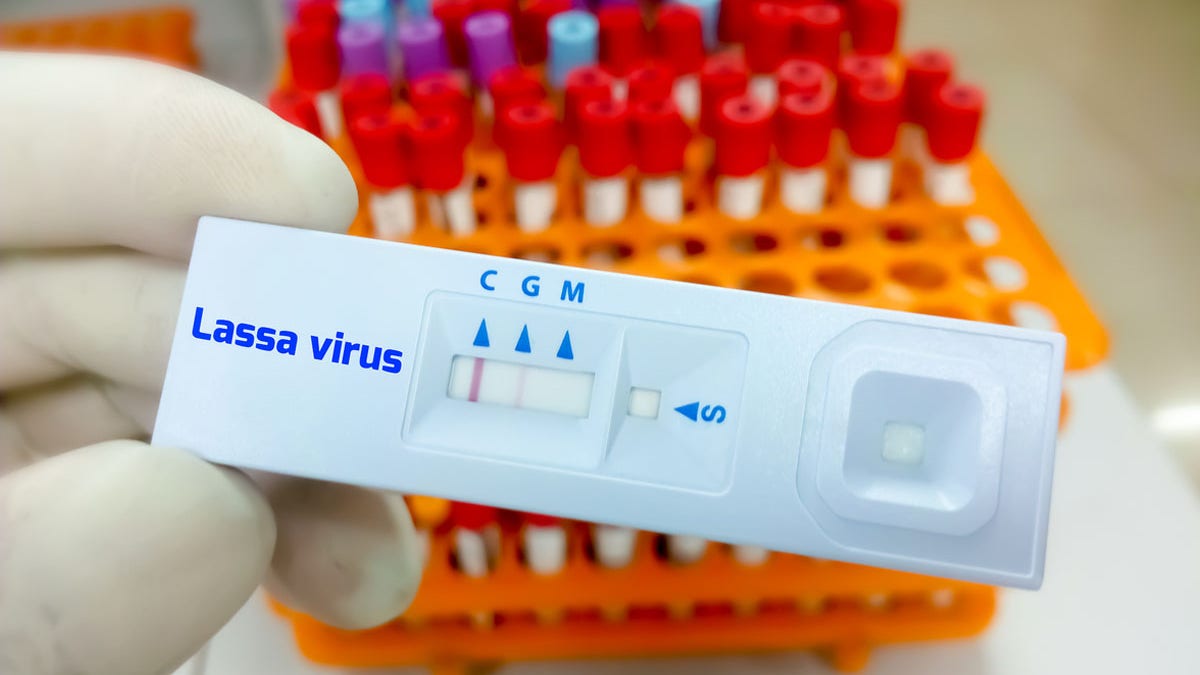Dr. Marc Siegel on measles outbreak: It is 'unbelievably contagious'
Fox News medical contributor Dr. Marc Siegel says Americans under 1 year old are at risk on 'America Reports.'
A middle-aged Iowa resident has died from Lassa fever, according to an alert from the Iowa Department of Health & Human Services (HHS).
The person, whose name and age were not shared, had recently returned to the state after traveling to West Africa, the release stated.
The initial testing of the patient was performed on Monday at the Nebraska Public Health Laboratory on Monday, and the Centers for Disease Control and Prevention (CDC) is "working to confirm the diagnosis," per Iowa HHS.
FAUCI SAYS WEST NILE VIRUS WAS A ‘HARROWING’ EXPERIENCE: ‘AFRAID I WOULD NEVER RECOVER’
"This is a difficult time for the family of this individual and I want to express our deepest condolences," said Dr. Robert Kruse, state medical director of IOWA HHS, in the release.

Lassa fever is a hemorrhagic viral infection spread by rats in West Africa. (iStock)
"I want to assure Iowans that the risk of transmission is incredibly low in our state. We continue to investigate and monitor this situation and are implementing the necessary public health protocols."
The patient received care at the University of Iowa Health Care, which is working closely with Iowa HHS, the CDC and other local public health partners to assist with contact tracing and monitoring, per the release.
What is Lassa fever?
Lassa fever is a hemorrhagic viral infection spread by rats in West Africa, according to Edward Liu, M.D., chief of infectious diseases at Hackensack Meridian Jersey Shore University Medical Center.
The viral illness is transmitted by a certain type of rat called the "multimammate rat" or Mastomys natalensis (Mastomys), per the CDC.
DEADLY MARBURG VIRUS OUTBREAK IN RWANDA HAS HEALTH OFFICIALS ON HIGH ALERT
"This is a very rare disease," Liu told Fox News Digital.
"Public health will have to follow close contacts of the patient to make sure there are no subsequent cases of Lassa fever."

"Diagnostic testing can be done in a laboratory with a high level of biosafety and enhanced infection prevention and control precautions," the CDC noted. (iStock)
People can catch the fever through contact with infected rats or their saliva, urine or droppings, the same source stated.
"Lassa fever can also spread between people by close contact with bodily fluids," Lui told Fox News Digital.
"Casual contact is not sufficient to transmit Lassa fever."
"Lassa usually is a mild disease, but in severe cases it can cause uncontrolled bleeding and shock."
The CDC confirmed that Lassa fever is not spread through hugging, shaking hands or sitting near someone.
"People with Lassa fever are not contagious until after their symptoms begin," the agency stated.

Not using proper personal protective equipment (PPE) or not properly sterilizing equipment in health care settings can cause the illness to spread. (iStock)
Below are some of the ways in which the virus can spread, as listed on the CDC’s website.
- Touching contaminated objects
- Eating food that has the virus
- Getting the virus in open cuts or sores
- Eating rodents
- Breathing in air that has infected urine or droppings, which can occur when cleaning or sweeping
- Not using proper personal protective equipment (PPE) or not properly sterilizing equipment in health care settings
Symptoms of infection
While about 80% of people experience only mild symptoms, it can be fatal in rare cases.
"Lassa is usually a mild disease, but in severe cases it can cause uncontrolled bleeding and shock," Lui cautioned.
Those with mild illness may have a slight fever, fatigue, weakness and headache, according to the CDC.
CLICK HERE TO GET THE FOX NEWS APP
In some cases, the fever can cause bleeding, breathing difficulties, vomiting, facial swelling, shock, and pain in the chest, back and abdomen.
Symptoms typically begin within one to three weeks after a person is infected.

The antiviral drug Ribavirin has been shown to be effective in treating the infection, the CDC stated. (iStock)
Hearing loss is a known effect of Lassa fever, with about 30% of people experiencing some level of deafness, the CDC stated. In some cases, the hearing loss can be permanent.
Pregnant women face a high risk of miscarriage if they are infected.
Diagnosis and treatment
Anyone who has visited West Africa and is experiencing symptoms should seek medical attention.
CLICK HERE TO SIGN UP FOR OUR HEALTH NEWSLETTER
"Diagnostic testing can be done in a laboratory with a high level of biosafety and enhanced infection prevention and control precautions," the CDC noted.

Supportive care — including rest, hydration and treatment of symptoms — is recommended for those with Lassa fever. (iStock)
The antiviral drug Ribavirin has been shown to be effective in treating the infection.
Supportive care — including rest, hydration and treatment of symptoms — is also recommended.
Preventing Lassa fever
The best way to prevent catching Lassa fever, according to the CDC, is to stay away from rats when visiting West Africa.
It is also recommended to keep food in rat-proof containers, trap rats in and around homes, and avoid eating rats.
For more Health articles, visit www.foxnews.com/health
Health care personnel should wear protective clothing, sterilize equipment and follow other infection control protocols when caring for infected patients, the agency added.










































